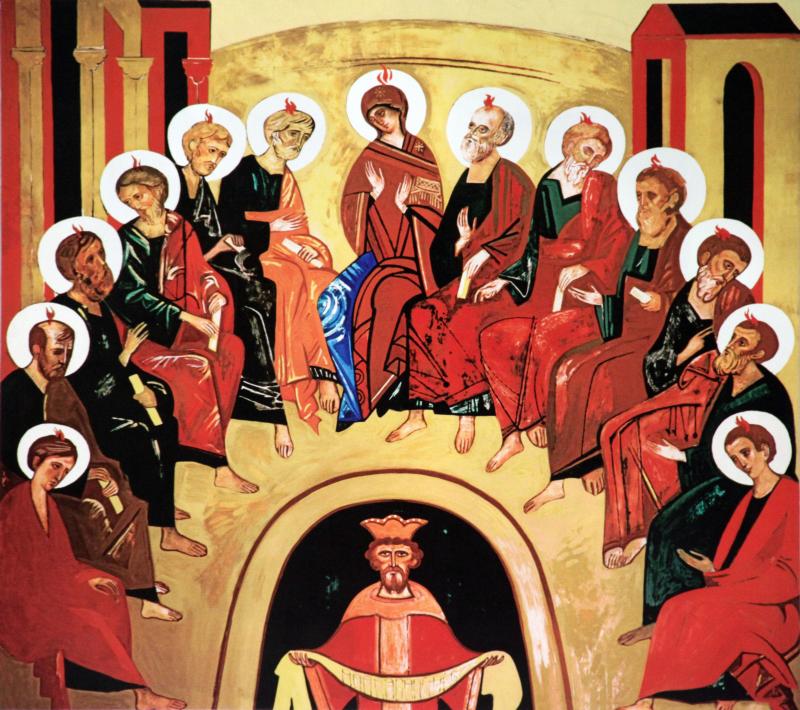
Artwork depicting the Holy Spirit descending upon the apostles 50 days after Christ’s resurrection is displayed at Our Lady of Divine Providence Church in Providenciales, Turks and Caicos Islands, in this 2014 photo. All of the baptized must see themselves as “missionary disciples,” sharing the zeal of Jesus’ first disciples. (CNS photo/Gregory A. Shemitz)
Pope Francis, in his 2013 apostolic exhortation “The Joy of the Gospel” (“Evangelii Gaudium”), says that the church, the people of God, is called to go forth and proclaim the good news of Jesus Christ to all the world. In order to do this, all of the baptized must first see themselves as “missionary disciples” (No. 120), on fire with the same zeal of Jesus’ first messengers.
To understand what it means to be a missionary disciple, a good place to start is with the stories that come to us from the early church. Both the Acts of the Apostles and the epistles tell us much about the dynamism experienced in the early years after Jesus’ death and resurrection.
The first missionary disciple was Mary Magdalene, who — after seeing the resurrected Jesus in the garden — ran to find the other disciples to proclaim the good news that Jesus had indeed risen (Mt 28:1-10; Jn 20:11-18). Jesus tells Mary, “Do not be afraid” (Mt 28:10), good advice for all disciples.
[hotblock]
After they received the Holy Spirit on Pentecost (Acts 2:1-4), the disciples took the good news of Jesus out into the world. Peter, as presented in Acts 2:14-41, so enthralled the crowd with his preaching that about 3,000 people were baptized that day. Acts 3-4 tells of Peter’s willingness to proclaim the message of Jesus to powerful groups, even after they tell him to be quiet.
The first disciple to be put to death for proclaiming the Gospel was Stephen, a deacon. He was stoned for proclaiming a message about Jesus that challenged people’s attitudes and beliefs. Most of the apostles and many of the early disciples were also martyred for witnessing to their faith in Christ.
Perhaps the most effective missionary disciple — and certainly the most famous — was St. Paul. Acts describes the three missionary journeys of Paul and his companions Barnabas, Silas and Timothy. Details of their often perilous journeys can be found in Acts 13-21.
So, what can we learn from these ancient teachers about being modern missionary disciples?
First, as Jesus said to Mary Magdalene, “Do not be afraid.” One has to be brave to proclaim the Gospel in the face of possible rejection, violence and even death.
Second, we must understand that as disciples we are sent by the larger Christian community. We go because we are compelled by our faith, not because we seek fame or fortune. While we probably won’t have Philip’s experience of being sent by an angel (Acts 8), we will still be moved to action by the Holy Spirit.
Third, in our proclamation we offer to others what the church believes and teaches, not our own personal ideas. St. Paul had to learn what it meant to follow Jesus before beginning his missionary journeys. Likewise, we have to prepare ourselves for the task at hand. If we are to proclaim the good news of Jesus, we must first understand it and love it deeply.
That’s what it means to be a missionary disciple.
***
Mulhall is a catechist who lives in Louisville, Kentucky.
PREVIOUS: Get creative — start a ministry and build community
NEXT: On Catechetical Sunday, remember we are all disciples on mission



Share this story